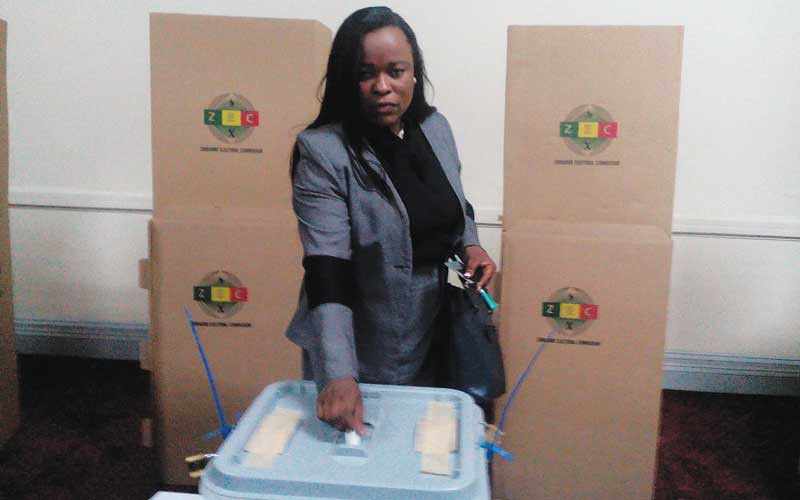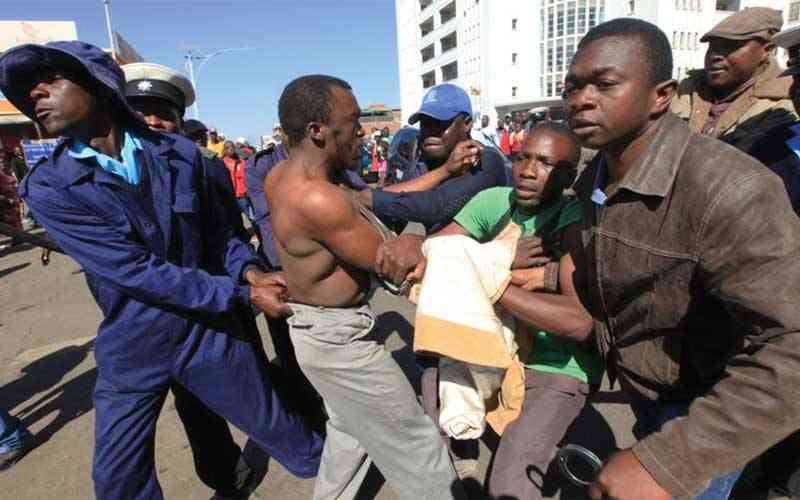
OPPOSITION MDC Alliance Nelson Chamisa’s political wave, summarised under his rallying code #NgaapindeHakeMukoma, has left Zanu PF mesmerised, confused and doing embarrassing things by conscripting the police, Central Intelligence Organisation (CIO), army and poorly paid chiefs, headmen and kraal heads into its politics.
At most, police officers and intelligence operatives in Mashonaland Central province, and not political structures of Zanu PF, have been running like herdboys who have lost their cattle.
The State security is being abused so that it monitors and disturbs Chamisa’s meetings in communities.
The police, CIO and army are being deployed to track and disturb Chamisa like they are the commissariat of Zanu PF.
Zanu PF structures, after the hyped restructuring programme, do not seem to have an answer to Chamisa’s resurgence after a long time of State onslaught against the young, charismatic opposition leader who carries the hopes of Zimbabweans, from pensioners, the middle aged who are living in poverty to the young who have never tested employment.
Those police and intelligence officers have their hope in Chamisa.
They are living in squalor while those who send them on dirty errands are living large.
The officers need to be saved from the dying Zanu PF, which has no answer to the freefall of the economy.
- Chamisa under fire over US$120K donation
- Mavhunga puts DeMbare into Chibuku quarterfinals
- Pension funds bet on Cabora Bassa oilfields
- Councils defy govt fire tender directive
Keep Reading
The situation obtaining on the ground is an indictment on the part of Zanu PF, which has failed to correct its economic wrongs.
Zanu PF has hidden behind COVID-19 regulations and abused the State apparatus to tame Chamisa.
All that has not worked as Chamisa’s intrusion into the rural areas has caused the ruling party sleepless nights.
After claiming that it has support in all the rural areas, Zanu PF cannot fathom being embarrassed by the numbers that are following Chamisa everywhere he goes.
Last Friday, police officers and CIO operatives in Guruve and Mbire were kept busy running in all directions, trying to locate where Chamisa was so they could disturb his meeting with his supporters and the populace.
To show the determination of the people, the police and CIO were outsmarted and Chamisa met his supporters.
President Emmerson Mnangagwa must stop abusing the security sector like he did last Friday.
He must interfere with Chamisa using Zanu PF political structures instead of using the security forces.
What he has done flies in the face of his claim that there is democracy in Zimbabwe when there is abuse, dictatorship and autocracy.
The present wave against Mnangagwa will triumph since people are living in abject poverty.
Those in Mbire had their cotton taken for near free. For those in Guruve, the price of a tonne of maize is terrible at $32 000. The price has been eroded by inflation. So it is poverty versus Zanu PF. People will vote Zanu PF out come 2023. –Isaac Mupinyuri
Rural teachers mobilise votes for education
THE Amalgamated Rural Teachers Union of Zimbabwe (Artuz) has intensified the #SaveOurEducationZw campaign through embarking on a drive to mobilise voters who will vote for a more inclusive and efficient education system.
The union launched the “mobilising votes for education” campaign in Masvingo on October 15, 2021.
The launch coincided with the training of trainers for 20 voting champions from five districts.
The voting champions, who are all teachers, were drawn from Zaka, Lupane, Chikomba, Hurungwe and Chipinge, four from each district.
The voting champions were trained on:
- Right to education in Zimbabwe
- Electoral literacy
- Integrating electoral literacy into non-formal education.
- Organising rural communities to participate in electoral processes.
- Harnessing accessible digital tools for communication.
- Engaging elected officials on right to education
- Organising an event and facilitation skills.
The training has been cascaded to two districts so far, namely Chikomba and Lupane.
The union is targeting to train a total of 220 voting champions in the five districts.
The voting champions will embark on a voter mobilisation drive aimed at improving enjoyment of the right to vote.
The union is convinced that if electoral literacy is improved in rural communities and the majority of eligible citizens exercise their right to vote, then duty bearers will be forced to deliver on fundamental social services such as education.
Artuz calls upon citizens of Zimbabwe to register to vote in numbers and vote for a government which pledges to commit 20% of budget towards education.
We further call upon citizens to help us compel the current government to increase budgetary support towards education to avert the collapse of the education sector. –Artuz
PPPs must help advance conservation, development in Africa
EUGENE Mutangana is a conservation management expert with the Rwanda Development Board (RDB), the department in charge of that country’s incredible parks and wildlife. Prior, he was the chief park warden of Akagera National Park, in the eastern part of the country.
A staunch conservationist, Mutangana recalls rampant cattle encroachment, fires, and poaching — and the resultant dramatic decline in wildlife. Without an adequate budget, team, and capacity, park staff could not overcome these threats.
Convinced of the value of Akagera National Park to the country, the Rwandan government made the decision to partner with the NGO African Parks to manage it under a collaborative management partnership (CMP) in 2010.
In time, park operations became more effective and wildlife — such as rhinos and lions — recovered. As a result of the enhanced management, ecological rebound, and the long-term perspective of the CMP agreement, leading tourism investors like Wilderness Safaris and Mantis developed world-class facilities in Akagera.
By 2020, the park generated more than US$2,5 million annually from nature-based tourism and employed 273 people (99% Rwandan). The partnership between RDB and African Parks helped convert a non-operational conservation area into an engine for the local and national economy — securing livelihoods, protecting globally significant wildlife, and preserving critical ecosystems.
A CMP is a contractual arrangement between a protected area (PA) authority (government, private, or community) and a partner (private or non-governmental organisation) to collaboratively manage a PA. Through this public-private partnership (PPP), the PA authority devolves certain management responsibilities — and in most cases funding obligations — to the partner. The duration of the contract varies and depends on the goals of the PA authority.
Not all CMPs are the same.
There are three different kinds: (i) financial and technical support, where the PA authority retains governance control and the partner provides support; (ii) co-management, which includes bilateral, where the State and partner agree to collaborate under a management agreement working side-by-side with the PA, and integrated, where the State and partner collaboratively manage through a special purpose vehicle (SPV) with equal representation on the board; and (iii) delegated, similar to integrated but more rights are devolved to the partner and the majority of the board is appointed by them. These models are described in the CMP Toolkit.
Like Rwanda, 14 other countries in Africa have entered into co-management and delegated CMPs, covering more than 11 percent of Africa’s PA range.
Even though the value of biodiversity and the role PAs play in securing the world’s natural capital and ecosystem services and mitigating the impacts of climate change are widely recognised, there is a massive funding gap for ensuring protected areas are adequately managed. For example, researchers found that in Africa, US$1,5 billion is needed annually to effectively manage PAs with lions. This funding gap and other factors have led to the underperformance of many PAs—putting species, ecosystems, and inclusive development at risk. –Further Afrika
- Follow us on Twitter @NewsdayZimbabwe











